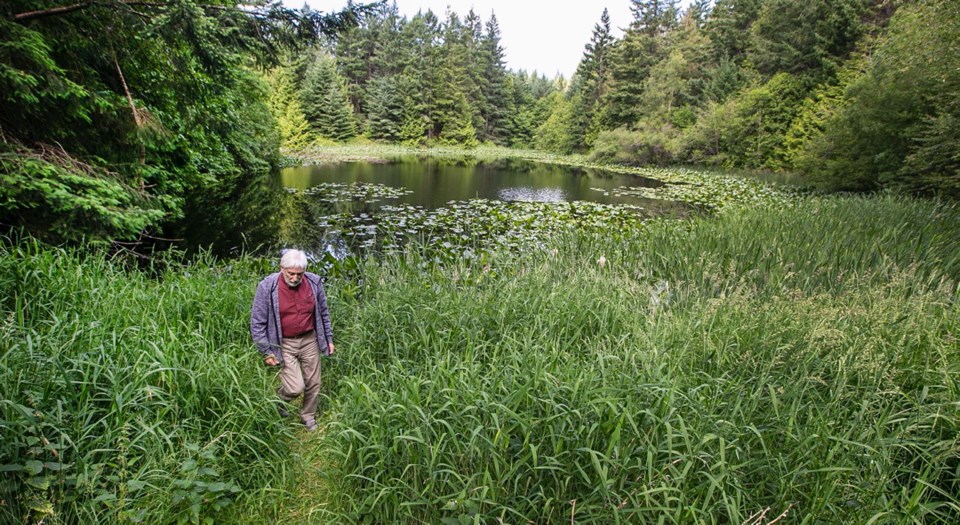Residents of North Pender Island are planning a protest today to stop work on draining a pond that is considered an important firefighting resource for the island and believed to be connected to nearby wells.
Work by the Capital Regional District began last week to empty the pond in Razor Point of more than 80 per cent of its water.
Mark Benson, who lives close to the pond and is helping to organize the protest, said the pond has already been emptied of about half of its 11 million litres of water.
“You can see the water bleeding down the hill,” he said, adding it’s difficult to watch the freshwater being pumped into the ocean on an island where many people hold off on flushing the toilet to conserve water.
The primary concern is that it remains unknown if the pond contributes to groundwater recharge of the largest aquifer on the island, which sits below the pond. An island-wide major groundwater study is underway.
Freshwater specialist William Shulba, who is undertaking the study for the Islands Trust, previously told the Times Colonist there has been no detailed hydrogeologic study of Gardom Pond to his knowledge, which means the relationship between the pond’s water levels and the water in nearby wells is unknown.
Benson is concerned the aquifer could collapse if the pond is emptied, causing salt water to infiltrate nearby wells.
The pond’s dam was deemed by the province in 1997 to carry a “high consequence” of damage to downstream properties and inhabitants if it were to fail. The regional government, along with five private water-licence holders on the pond, have been working to resolve the issue for years.
The decision to drain the pond and decommission the dam was based on an estimate that it would cost $1.5 million to reinforce the dam. Residents have questioned that figure, saying the cost of the project was recently estimated at under $280,000.
The CRD has said its estimate came from a senior engineer in 2013 and was updated in 2015.
Engineering staff applied inflation rates to the 2015 estimate of just over $1 million, according to the CRD.
South Pender Island trustee Steve Wright obtained the $280,000 quote in early July from a Duncan-based contracting company, but he cautioned that it’s an incomplete estimate, because engineers from the company didn’t visit the site.
“For people to rely on that as a cost of doing the work is a huge mistake,” he said.
Responsibility to pay for work on the dam rests with the pond’s six water-licence holders — four of whom are retirees whose homes border the pond. The CRD and the developer of the subdivision next to the pond are also licence holders.
Terry Chantler is a licence holder who has said he had no choice but to agree to decommission the dam, because he couldn’t afford his share of the cost to reinforce it, estimated at $250,000.
Last November, the CRD secured $491,000 in federal funding for national disaster mitigation to decommission the dam. The National Disaster Mitigation Program provides grants to projects that mitigate flood risks.
The draining is expected to take about two weeks. Once it’s complete, the CRD can begin work to decommission the dam.
Benson says residents might have lost the fight to keep the pond full, but they’re hopeful they’ll be able to pressure the CRD to hold off on decommissioning the dam.
Instead, they want to reinforce the dam and allow the pond to refill naturally with rainwater over the winter.
West Coast Environmental Law provided a small grant to help the community hire a lawyer to look into legal options to stop the work, but they weren’t able to find a legal avenue to intervene.
Benson launched an appeal to the Environmental Appeal Board, which hears cases related to environmental issues resulting from decisions made by government.
He appealed on the basis that physical harm was being done to his property because of the potential impact to his well, but the appeal was denied on the grounds that his well is not considered property.



